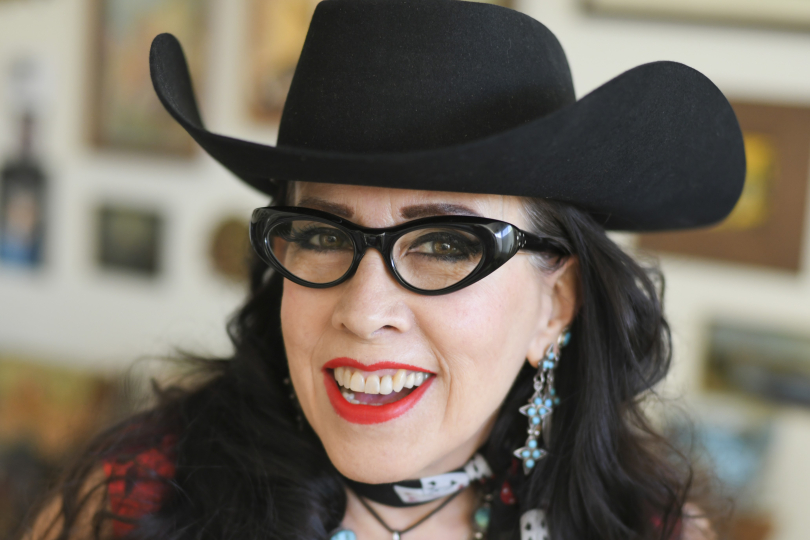
Pearl Harbour: I Couldn't Get on the Radio Because of My Name
Pearl E. Gates started her musical career in San Francisco in the 1970s where she formed part of the wild band The Tubes, which fused rock music, theater and cabaret in its shows. After a brief stint with another local band, Leila and the Snakes, she adopted the stage name Pearl Harbor (later changed to Harbour in Britain) in 1978 and recorded a well-received debut album for Warner Bros. with her new band, Pearl Harbor and the Explosions. Her desire to play rock & roll brought her to the UK, where she worked with artists such as Ian Dury & The Blockheads and The Clash. In 1982, she even married The Clash bassist Paul Simonon, with whom she lived for seven years. To mark the March release of the expanded edition of her iconic album Don't Follow Me, I'm Lost Too, Pearl gave us an exclusive interview.
You lived with your family in Germany until you were 17, but then you announced that you were moving to San Francisco. What led you to that decision? And why San Francisco?
Well, when I was seventeen years old, I was a bad teenager (chuckles). I was always in trouble and I knew I wanted to sing and to be in a band. I have four older brothers and one of them was in a band so I always wanted to do that too. I was still in high school and I said to my parents: "I don't wanna go to school anymore, I just want to play music and I wanna move to San Francisco." My parents asked me why San Francisco and I said: "I don't know. I just wanna go to California and San Francisco sounds like a good city." You know, my parents were angry with me because I was always in trouble so they said: "Fine, go!" (laughs).
My father bought me an one-way airplane ticket, gave me 75 dollars and said Goodbye. So I moved to San Francisco. I had never been there but I did know a couple of people who lived there so I was able to get in touch with them and I lived with them when I first moved there until I got a job and got my own place. I always thought that San Francisco was interesting because it was full of music, hippies and drugs and I liked all three of those things when I was seventeen years old in 1973.
You soon joined the famous band The Tubes. You were a dancer but did you also get the opportunity to sing with them?
They had a talent contest. People got up on stage and did singing, dancing or comedy, whatever. I won the contest by tap dancing. I was a tap-dancing boxer. And they asked me to be at their show. For the first few weeks, I just did tap dancing and all kind of silly things with them and then they asked me if I wanted to sing background vocals and I said yes. I did many shows with them, only in California. I did background vocals, percussion and dancing.
So, did your first musical steps start in San Francisco or did you get some experience when you were a teenager in Germany?
No, that was my first experience. When I was in high school I was in a selected group of singers so I sang when I was in high school but I'd never been in a band.
In 1978, you came up with the stage name Pearl Harbor and started the band The Explosions – what's the story behind your name?
When I was in The Tubes, there was a woman, a keyboard player, her name was Jane Dornacker and she had an all-girl group called Leila And The Snakes. She asked me if I wanted to be in her band as well as The Tubes. After a while I stopped performing with The Tubes because they didn't really need me, they had so many people in their band. I just was in Leila And The Snakes for a year and a half. Performing with her band it was really fun and I learned how to be a good performer. I learned everything about being on stage through Leila And The Snakes. After a while I wanted to write my own songs so I told her I was leaving. I took the bass player and the drummer with me, they were brothers. It was during new wave and punk times, in 1977, so we wanted to have a name that sounded a bit sort of aggressive. We chose Pearl Harbor & The Explosions.
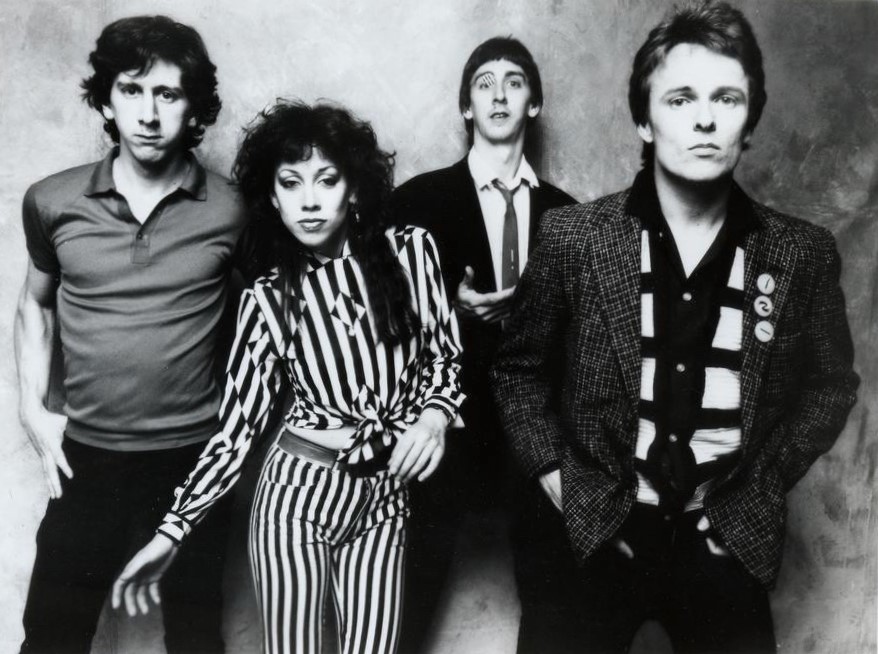
Pearl Harbor was still a fresh memory for Americans at that time. Wasn't the name Pearl Harbor & The Explosions a problem for you at times? Didn't that close some doors in the music world, I mean that they cancelled your shows or something like that?
Yes, it was a problem. I couldn't get on the radio because of my name. But to be honest, I didn't really care because I just wanted to do what I wanted to do. That's how I've always been and I'm still that way. I don't care if I am gonna get in trouble, I don't care if somebody doesn't like something. I just do what I wanna do. But yes, it's true that it wasn't a very smart move to call the band Pearl Harbor & The Explosions cause Americans did not like it.
You released a decent debut album with The Explosions, you toured quite a lot and you were on a roll. But then the band broke up and there was no second album. What was the main problem? Supposedly you guys didn't get along musically anymore, is that right?
That's right, we didn't get along musically because when we first started Pearl Harbor & The Explosions, we didn't know what were we going to do. I wanted to have a rock & roll band and they didn't. They were more into jazz, fusion. They were very good musicians, they called rock & roll mindless. When we were writing music together and rehearsing we were always arguing. They would come up with this music and say write lyrics to this and I was like: "I don't like this music." And they said: "Too bad cause we do." Anyway, I worked with them and we wrote enough music for an album. But it wasn't fun for me because I wanted to sing rock & roll. But I was so new, we were so young, twenty, twenty-one. We really didn't know what we were doing.
Then I met Kosmo Vinyl who worked with Ian Dury & The Blockheads and The Clash. I met him in a rehearsal studio. He saw our band and said that we were good. I told him that I wanted to sing rock & roll and he said that I should move to London. Soon as I finished touring to promote the album I moved to London. Warner Brothers records were very angry with me because they put a lot of money into promoting Pearl Harbor & The Explosions. They allowed me to record a solo album which is Don't Follow Me, I'm Lost Too. They didn't like it so then they threw me off the label (chuckles).
In the late 70s, there was a big punk explosion in London and Britain. Did you have any interest in this new music at the time?
Yes, I did. With Pearl Harbor & The Explosion and even Leila & The Snakes, we played with Elvis Costello & The Attractions on their first tour. We became friends and the band told me all about what was going on in London, about Stiff Records that had Ian Dury, Nick Lowe and Elvis, Wreckless Eric, all these great musicians. I learned about all of that. I mean, I had the Sex Pistols album, so I knew all about that. I'm not really keen on hardcore punk because it's a bit too aggressive and negative for me, I like things with a sense of humour. I did like The Clash because they were more musical and also more rock & roll. That's how I started working with The Clash and Ian Dury, and why I moved to London, through Kosmo.
So now an extended version of your solo album Don't Follow Me, I'm Lost Too is gonna be released. The album is full of rockabilly, rock 'n' roll and country influences. Was that album the direction you wanted to take with The Explosions?
Yes!
The record includes great musicians, members of The Clash, Wilko Johnson from Dr. Feelgood and Steve New from Rich Kids, as well as musicians from Ian Dury and The Blockheads. I think their keyboardist Mickey Gallagher even produced the album. Who chose this interesting team of people for your album?
Kosmo and myself. Kosmo was my manager and he was also the personal manager for Ian Dury and The Clash. Kosmo asked all these people from The Blockheads and The Clash if they would like to work with me. They heard some of my music, they met me and they knew that I knew my history of music and they liked me. They said: "Yes, let's do this." I said to Kosmo that I wanted to work with a rockabilly guitar player. He suggested Nigel Dixon from Whirlwind. They were a popular rockabilly band in London back then. I wrote a lot of my songs with Nigel and that was really fun experience. I used to go to his flat every day, we just sat around and drank beer and wored on music and that's how we wrote the album.
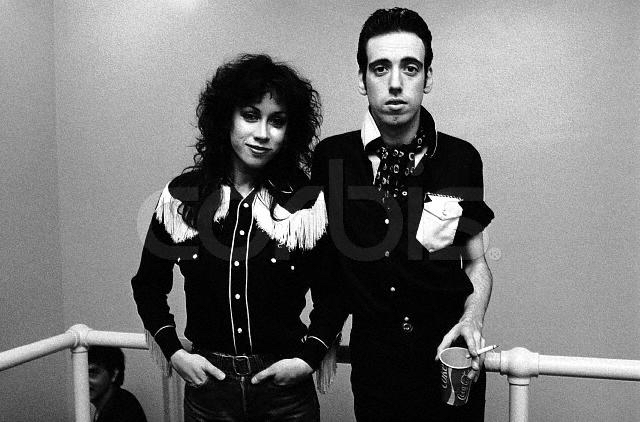
After that, you often appeared on stage with The Clash when you sang "Fujiyama Mama" on their tour. Who came up with the idea to include you in their concert program?
After I recorded my album with Topper (Headon) and Paul (Simonon), they played on every song, Mick Jones played just on one song. After making the album with them, we became very good friends. After the album was finished, I started going out with Paul, he was my boyfriend after a while. I was always hanging around with The Clash. Lots of times my band would be the support act or I was on tour with them just because I wanted to be with Paul. When we were in Japan, they said: "Hey, why don't you come up on stage and sing 'Fujiyama Mama' for the Japanese crowd?" It was fun and after that, I appeared with them many times.
You also appeared in the 1983 movie called Hell W10. That whole period seems to me as extremely creative, great were albums being made, movies, experimentation. How do you feel about that time?
I was so lucky to be in London and be with The Clash because they were always doing things. Just like you said, very creative times. They were always rehearsing, writing music, Joe always wanted to make films. Everybody was in their 20s and everybody had a lot of energy to do a lot of things. Nobody just wanted to sit home and do nothing. We were always doing something creative and it was really fun. The music scene in London, there were so many great bands and I really enjoyed going to concerts and shows every week. It was a wonderful time to be in London, I was very lucky.
In 1986, The Clash broke up. That was back when you were living with Paul. Did you discuss that situation together at home or did he not bother you with the band problems?
We discussed that many times. The Clash would have their band meetings in our house so a lot of times I would sit at the meeting and listen. I wouldn't really say much but if someone asked me what I thought, I would say something. I was very sad about it, I didn't want The Clash to break up but at the same time, they weren't happy. I think Joe had realized that he made a mistake by firing Mick Jones. The two of them were a great writing team. No matter who they hired after Mick left, nobody was ever as good as Mick and Joe. That was a mistake but they were young and they were angry with Mick. They wanted to keep playing, keep touring and Mick was tired. He said: "Let's take a break, I need a holiday." And they said: "No, you go on your holiday and you are not in the band anymore." That was a shame, that was too bad.
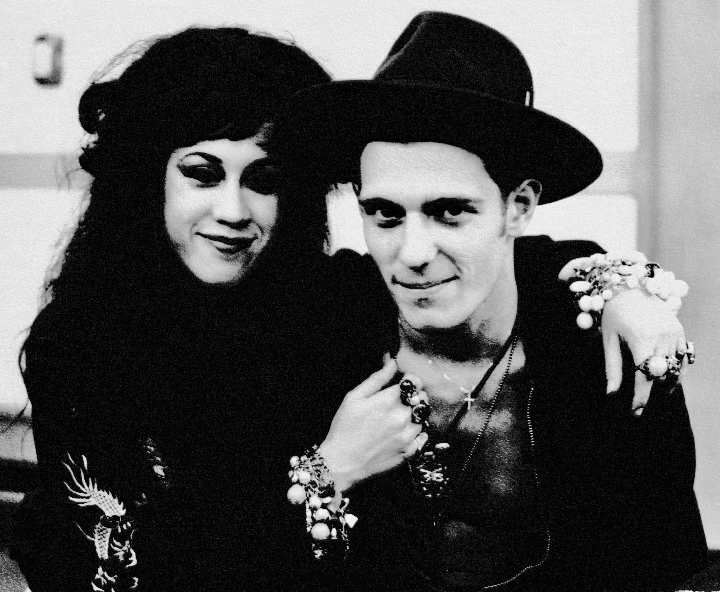
Did you have similar musical tastes? I mean, were you thinking about starting a band or some project together after The Clash broke up?
Yes, Paul and I liked the same kind of music, we both liked rockabilly, old 50s and 60s music, Paul especially liked old dub, reggae and ska. He taught me all about that. I loved that music. Every day at home he would play reggae records and play along with his bass. We liked the same music and that was really something that kept us together. And then when The Clash broke up, Paul and I put a band together with my guitar player Nigel Dixon as he was a good friend with Paul too. We started to write music, everything was fine and going great and then Bernie Rhodes, Clash's manager, came over and he said to Paul: "What are you doing, working with Pearl? Who do you guys think you are? Paul and Linda McCartney?" And I said to him: "Don't talk to me like that. We're having a good time. Leave us alone." He said to Paul he shouldn't be playing music with me and he should go to the United States with Nigel and buy Harley Davidsons, travel around, have some fun and come up with new ideas for the songs. He told him that they should put together a band without me. I thought Paul would say no but Paul said: "Oh yeah, you're right." It was horrible, I was so upset because my husband, my best friend and my guitar player, they left. They went to the United States and had a lot of fun. That was kind of the beginning of everything because I was so upset that Paul did that. That's what happened.
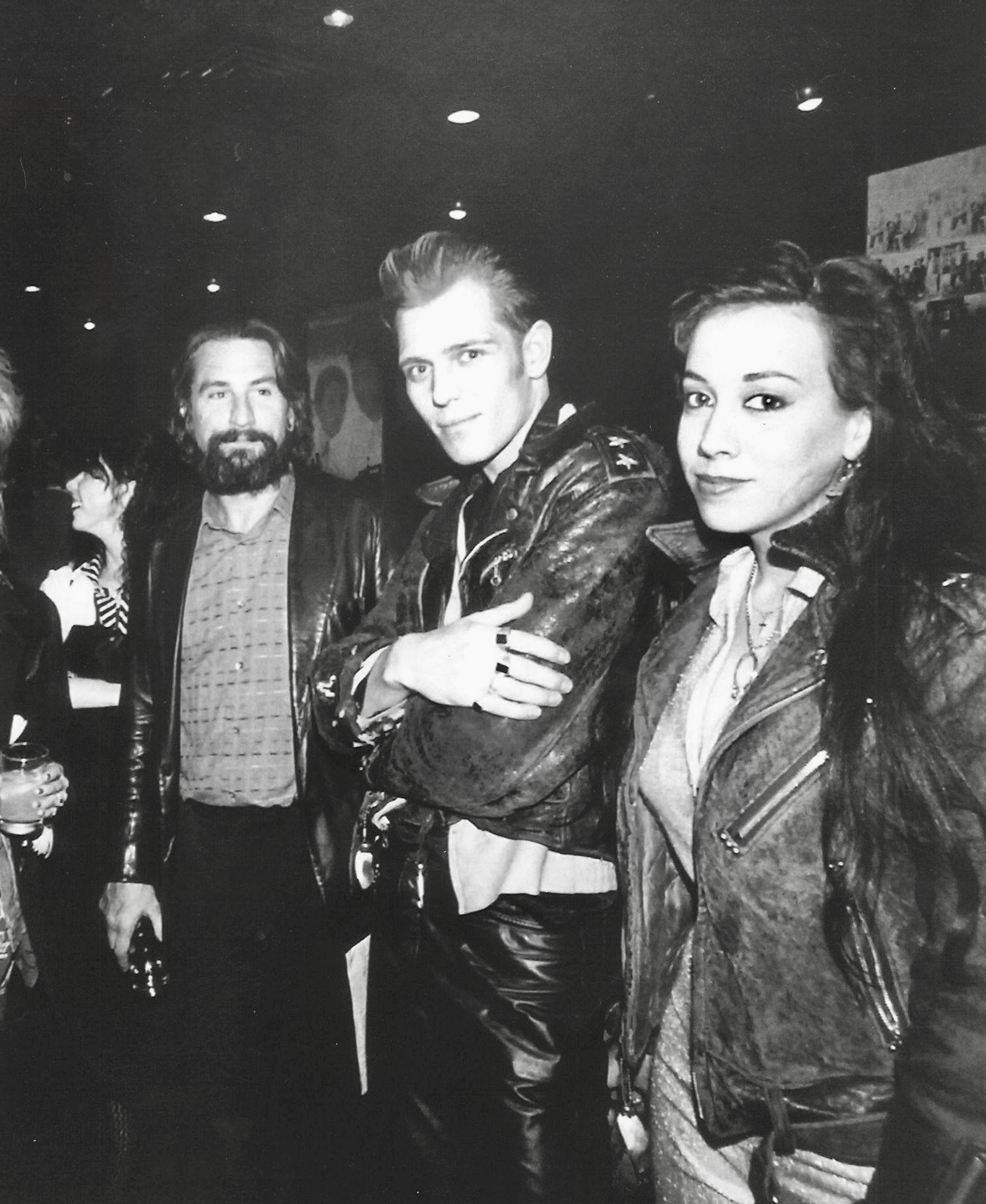
There was the song "2 Bullets", written by Joe Strummer, which appeared in the Sid & Nancy movie.
When Joe was doing the music for the soundtrack for Alex Cox, Joe knew that I liked country music and that I could sing it. And he wanted to write a song for that scene when Sid Vicious was in Texas. He just called that he wrote a song for me and that it's gonna be in a movie, it will play on the radio for a minute and it will be really easy. I went to the studio, Joe played me a song, he sang it to me and handed me the lyrics. I told him I can do that. I did it very quickly, in one take and he said that it is great. I was like: "Oh no, I wanna do it better." But he said it was fine because it's just gonna be a small scene and you're gonna be singing from the radio so it doesn't matter that it is not perfect.
There's a forgotten album called Pearls Galore from 1983. Aren't there plans to re-release it as well?
I contacted Island Records in England and asked them but they said that I couldn't release it, then I tried to contact Epic Sony in Japan and they said the same. Maybe in another few years, they might change their mind but for the moment they said no. Not many people have heard it because they didn't really promote it properly and that one for Epic Sony, that was for Japan only.
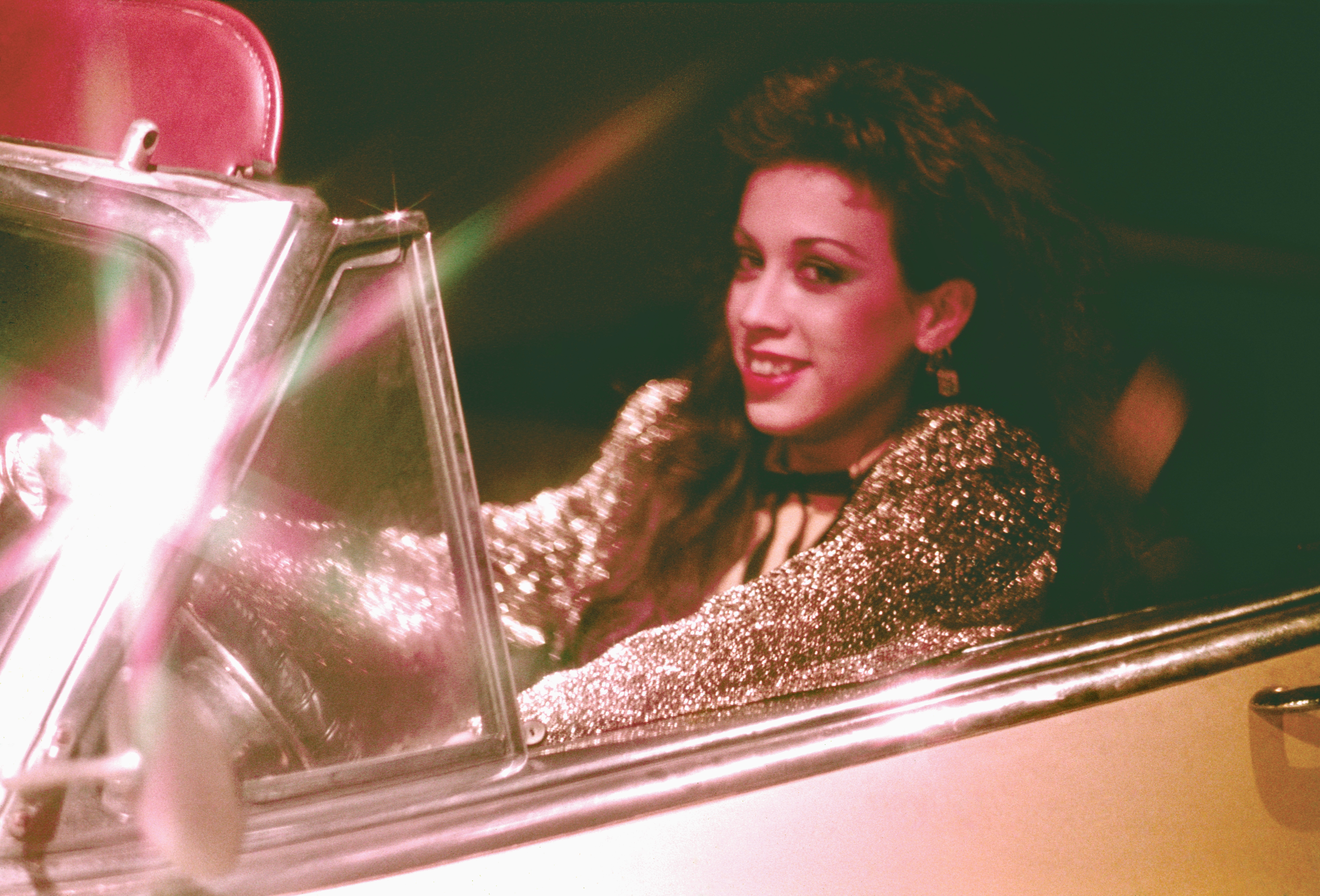
Then in the 1990s, you made the Here Comes Trouble album, which featured another big punk rock name, Dead Kennedys' guitarist East Bay Ray. How did your collaboration happen?
When Paul and I split up, I moved back to San Francisco. I immediately wanted to put together a new band because that's all I knew how to do. I went to a lot of shows, I was trying to see all the local musicians and what was going on. There was a band called Buck Naked And The Bare Bottom Boys and they were a really funny rockabilly band. I loved them. I said to Buck who was the leader of the band that I would like to start a band with him. He said yes. I said: "How about picking up all your favourite musicians?" He had East Bay Ray on lead guitar. We just called all the people that he liked and everybody said yes.
If you have found an error or typo in the article, please let us know by e-mail info@insounder.org.

